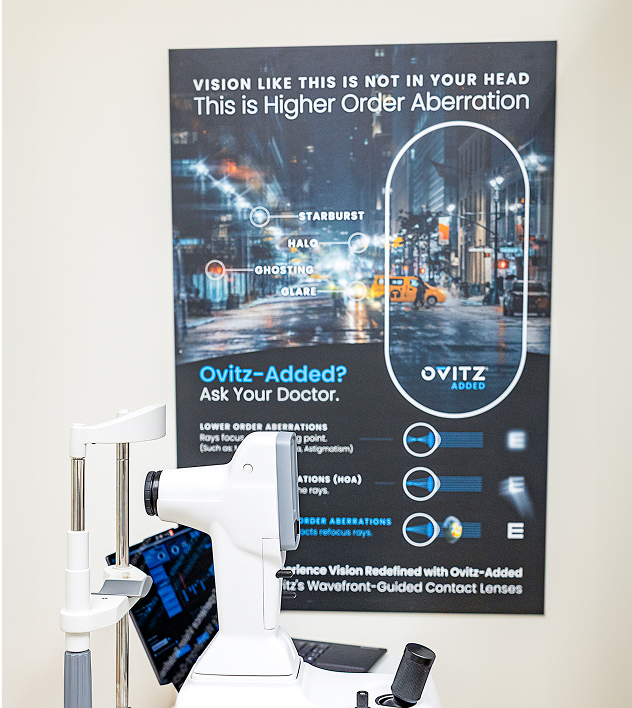Wavefront-Guided Clarity with OVITZ
xwave Technology
Do you have higher order aberrations (HOA)?
You might have HOAs if you experience…



Glare & Flare

Halos

Starburst

Ghosting

Double Vision

Blur
Told Your Vision Cannot Improve?
You may have passed the eye chart — but your vision still doesn’t pass the reality test.
At the Raleigh Contact Lens Institute, we’re proud to be among the few practices in the country offering advanced, truly customized solutions with the OVITZ xwave aberrometer. This innovative technology allows us to address residual HOAs more precisely, helping patients achieve sharper, more comfortable vision.

What Are Higher Order Aberrations?
If you already wear specialty lenses—such as scleral lenses or gas-permeable contacts—but still struggle with glare, halos, starbursts, ghosting, or poor night vision, you may be experiencing Higher Order Aberrations (HOAs).
HOAs are subtle irregularities in how light passes through your eye. These distortions can come from the cornea, the eye’s natural lens, or other internal structures. Even with high-quality specialty lenses, some of this distorted light can still reach the retina, leaving vision that feels “off,” even if your prescription is accurate.
Think of it like shining a flashlight through smooth glass versus a cut crystal—the tiny imperfections in HOAs can dramatically change how clearly you see.

Why Standard Tests Miss HOAs
Most routine eye exams don’t detect Higher Order Aberrations (HOAs). Traditional tools, such as corneal topographers, only measure the front surface of the eye, overlooking distortions that occur deeper in the visual system. Even when HOAs are suspected, they often remain untreated simply because the technology to address them is not widely available.
The OVITZ xwave aberrometer goes beyond standard testing by scanning the entire optical pathway—not just the cornea. This advanced mapping detects even the smallest aberrations. Using this data, doctors can design OVITZ-Added Lenses, which incorporate custom optics into a stable scleral lens to neutralize your eye’s unique distortions.
It works like noise-canceling headphones for your vision—reducing the “visual static” and providing clearer, more comfortable sight than ever before.
This advanced technology is often recommended for patients with:
- Keratoconus
- Post-LASIK or RK vision complications
- Scarring or irregular corneas
- Ongoing visual issues despite “normal” vision
- Ghosting, starbursts, or night glare
Even individuals with otherwise healthy eyes may benefit if HOA-related symptoms interfere with clarity.
At the Raleigh Contact Lens Institute, we specialize in advanced solutions for complex vision needs. For the right candidates, combining OVITZ technology with a custom scleral lens can deliver a dramatic improvement in clarity — often where standard options fail.
Each OVITZ xwave aberrometer scan is carefully reviewed by a trained engineer or doctor from the Ovitz team. This ensures a design uniquely tailored to neutralize your eye’s specific distortions, providing the clearest, most precise vision possible.
Why the Raleigh Contact Lens Institute for
Correcting HOA’s Using OVITZ ?

The Team
The team at the Raleigh Contact Lens Institute are experts in scleral contact lenses and optimizing vision through the OVITZ xwave Aberrometer..

Advanced Technology
Our office is one of a few practices in the country that is equipped with the Pentacam AXL Wave, Optovue Solix OCT, EyePrintPRO, and OVITZ xwave Aberrometer, which aid in the design and optimization of your vision in scleral contact lenses.

Unlimited Answers
We allow for enough time for thorough comprehensive exams, and plenty of time for answering questions. No rushing in and out here.

The OVITZ Specialists in Raleigh
At our office, designing specialty contact lenses utilizing OVITZ technology is "what we do", which provides us the expertise, experience, and ability to have specialized technology so we can provide the best possible care, and results.

Access to the Doctor
Our doctors are available to answer questions you have after your exam, and will make sure you have the information needed in order to ensure the best possible outcome.

Affordability
We keep our overhead costs low and offer very competitive prices as a result. We have monthly payment options available and also accept CareCredit™, HSA, & FSA.

Summary
Wavefront-guided vision correction using the OVITZ xwave aberrometer is one of the most advanced services we offer at the Raleigh Contact Lens Institute. While a referral from another doctor is not required to become our patient, we frequently receive referrals from over 100 doctors in the region who trust our team to care for their most complex vision cases — especially patients still struggling with symptoms like glare, ghosting, or halos despite wearing specialty contact lenses.
Each scan is reviewed by an experienced engineer or doctor on the OVITZ team to ensure the highest level of accuracy and visual outcome.
Our doctors are recognized nationally for their expertise in advanced contact lens technology and regularly present at national conferences on how new tools like OVITZ are reshaping the future of specialty lens care.
If you’ve been told there’s nothing more that can be done for your vision — OVITZ may help you see differently.
If you have questions about higher order aberration correction, we can be reached at (919) 850 5910 or hello@raleighcontactlens.com.
Our Doctors Lecturing on Specialty Contact Lenses



